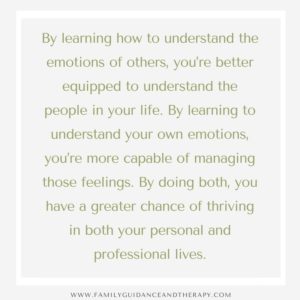What is Emotional Intelligence?
Emotional Intelligence is someone’s ability to “identify and assess his or her emotional state, as well as the emotional state of others.”
To be more specific, it’s a person’s ability “to relate to others, work in groups, read between the lines in conversation, and interpret behaviors and moods displayed by others.”
Emotional Intelligence isn’t related to IQ, but in some cases, it’s more important.
Some studies have even found that 80% of competencies that differentiate top performers from others are in the domain of Emotional Intelligence.
Many people find that they need emotional intelligence to succeed in life.
We all define “success” differently, but for most of us, success means achieving goals we’ve made for ourselves in our relationships, career, and other aspects of our lives.
Emotional intelligence is a big part of that.
Autism and Emotional Intelligence
Many autistics struggle with emotional intelligence.
Some psychologists believe that the concept of theory of mind explains this.
According to theory of mind, the better you are able to imagine the world from another person’s point of view, the better you’ll be able to understand, interpret, and react to their emotions.
You’ll be better able to empathize, understand what conversation topics are appropriate, and anticipate how a person might respond to certain statements.
The problem is that someone on the autism spectrum experiences the world differently.
Some autistics have a tendency to take conversations and events literally, which means that the emotional subtext is often not seen or misunderstood. This can lead to behavior that appears “inappropriate at best, heartless or cruel at worst.”
Some autistics may not understand why a friend or colleague is so upset about something that doesn’t seem that important, or that happened a long time ago.
They may not understand the emotional subtext when their partner says, “I’m fine,” meaning they miss the fact that their partner is actually not fine.
Developing Emotional Intelligence
The good news is that emotional intelligence can be learned.
Nora Infante—a licensed psychologist and senior executive coach—worked with a senior executive at a large tech company to improve his emotional intelligence.
The executive, who Infante determined was likely on the autism spectrum, stated that he “just didn’t get” empathy and scored low in the areas of empathy and relationship management on a company emotional intelligence evaluation.
While he showed strengths in self-awareness and self-management, he received feedback that he was “disengaged and insensitive.”
Through the coaching sessions, he was able to learn how to understand his team, even if he didn’t relate or have the same needs.
He was coached on workplace practices that look like empathy, even if he didn’t always experience the feeling of empathy.
The practices were broken down into small, concrete steps that were easier for him to follow.
He also kept a journal of the things he’d learned and made a habit of looking over them regularly.
He will most likely never be a very empathetic person, but through coaching, he was able to learn, rehearse, and ultimately master the skills of emotional intelligence.
Developing emotional intelligence doesn’t just mean picking up on and reacting to other people’s emotions. It also means having a firm understanding of your own emotions and how to deal with them.
For some people with autism, even knowing what you’re feeling can be challenging.
Maverick L. Crawford III, autistic adult and author of “Overcoming the Odds: My Journey to Finding Personal Strength and Triumph,” suggests journaling.
Keeping a daily journal to record your feelings, using a score of 0-10, with 10 being the highest and 0 being the lowest, can help you to see what happened that day, how it made you feel, and how it connects with your overall feelings.
You might also be interested in: How Journaling Can Help Us To Be More Grateful
Crawford says, “With time and reflection, writing will allow you to identify your stressors, and what makes you feel better.”
He also suggests the “Three R’s” for ridding your mind of negative thoughts and replacing them with more helpful ones:
“Recognize: First and foremost, we must recognize the bad thoughts and feelings and take ownership so we can take action.
Replace/Restore: Replace bad thoughts and feelings in your mind and restore them with positive ones. Throw out bad feelings and watch them pass by out of your mind like a passing car. Allow good thoughts to flow in and allow them to run rampant through your mind.
Repeat: You will have negative thoughts, so it is important to repeat this process frequently, or every time you have a bad thought or feeling.”
By learning how to understand the emotions of others, you’re better equipped to understand the people in your life.
By learning to understand your own emotions, you’re more capable of managing those feelings.
By doing both, you have a greater chance of thriving in both your personal and professional lives.
How We Can Help
We know that the autism spectrum is just that - a varied and diverse spectrum of individuals.
However, autistics do tend to share some common experiences like having difficulty with social interactions, relationships, and communication.
If you or someone you know needs mental health counseling, schedule an appointment with us.


My 19 year old son would never write down his emotions and score them. He will never work on himself like that. He wouldn’t even entertain listening to the suggestion. I literally do no think he is capable of it. So he goes through life lonely and unliked by the majority of people. I hate autism.